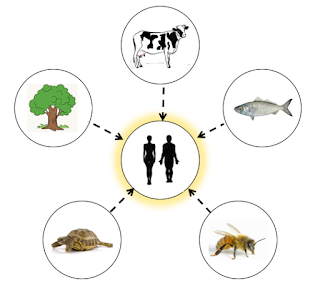Glossary
Erasure pattern: A linguistic representation of an area of life as irrelevant, marginal or unimportant through its systematic absence or distortion in a text or discourse.
Frame: An unconscious conceptual structure, a system of words/concepts that closely relate to each other and co-constitute meaning. As a whole, a frame allows human beings to understand reality - and sometimes to create what we take to be reality. For example, we can frame our understanding of pigs as inputs of production in a meat factory, or alternatively as sentient, intelligent and social beings that require respect.
Mass noun: A mass noun is an abstract concept that generalizes and homogenizes an ensemble of entities. The purpose of a mass noun is to be able to incorporate many elements into a single word, so that one can convey all those elements at once. For example, when one says "nature", one conveys birds, flowers, turtles, the sun, the sea, and so on, all at once. Thus, mass nouns' purpose is to encompass rather than to examine.
Examples: humans, humanity, environment, nature, biodiversity, natural resources.
Metaphor: The essence of metaphor is understanding one thing in terms of another. Metaphors allow us to grasp an abstract idea (such as time, value, relationships, logic, nature, etc.) in terms of familiar human experiences and contexts(such as temperature, space, vision, movement, being a child or a parent, etc.).
Example: When we say "this is a central idea" we use experience of space (the center) to grasp the abstract idea of importance. When we say 'prices are going up again' we understand a change in quantity (more) as a spatial movement (up).
Nominalization: It is the process of transforming a verb or adjective into a noun. Nominalization tends to erase the subject responsible for the verb.
Examples: Pollute => Pollution; Deforest => Deforestation.
Passivization: It consists in changing a verb or sentence into the passive voice, so that the subject carrying the action becomes erased.
Example: Mining industries are depleting water resources => Water resources are being depleted.
Social reality: it refers to the totality of cultural practices that define a human community as singular. This includes (i) practices such as language, music, rituals, food cultivation, technology, social roles, power distribution, social norms and institutions. It includes also (ii) a collective imaginary that includes ideas about what the world is, which elements conform it; what is human and what is our role and purpose of existence; how should we relate to other living beings, and so on.
Trace: A trace happens when a discourse represents the natural world in a way which obscures it, leaving just a faint trace of the living world to which they refer.
Examples of trace nouns are: natural resources, biodiversity, green infrastructure, natural capital.




Comments
Post a Comment